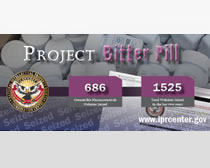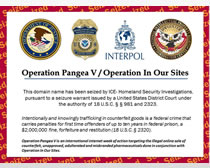HSI seizes 686 websites selling counterfeit medicine to unsuspecting consumers
WASHINGTON – In the largest operation of its kind, 100 countries took part in an international week of action targeting the online sale of counterfeit and illegal medicines. U.S. Immigration and Customs Enforcement's (ICE) Homeland Security Investigations (HSI), in coordination with the Department of Justice, seized 686 websites this week that were illegally selling counterfeit pharmaceuticals. The seizures were part of Project Bitter Pill, the current effort under of Operation In Our Sites (IOS). Bitter Pill was part of the INTERPOL-led Operation Pangea V.
A global enforcement effort, Pangea is an annual operation aimed at disrupting the organized crime networks behind the illicit online sale of fake drugs. Worldwide, preliminary results show Pangea has accounted for 79 arrests and the seizure of 3.7 million doses of potentially life-threatening counterfeit medicines worth an estimated value of $10.5 million. Additionally, approximately 18,000 websites engaged in illegal sale of counterfeit drugs were taken down.
During Pangea V, which ran from Sept. 25 to Oct. 2, operations were conducted in Europe and throughout the United States at websites linked to the illegal Internet supply of medicines. U.S. Customs and Border Protection (CBP) intercepted packages that were believed to contain fake or illicit drugs. Various payment processing companies supported the operation by identifying and blocking payments connected to illicit online pharmacies, identifying individuals responsible for sending spam emails and identifying abuse of electronic payment systems.
"These international partnerships are essential in the global fight against the trafficking of counterfeit drugs," said ICE Director John Morton. "Instead of taking potentially life-saving medicines, customers are duped into purchasing drugs that are fake or untested and could ultimately do them more harm than good."
Pangea is coordinated by INTERPOL, the World Customs Organization, the Permanent Forum of International Pharmaceutical Crime, the Heads of Medicines Agencies Working Group of Enforcement Officers, Pharmaceutical Security Institute, and Europol. For the first time, Pangea was also supported by the Center for Safe Internet Pharmacies which brings together 12 of the world's leading Internet and e-commerce companies.
"When someone is sick, can't afford to purchase expensive medicine or is just trying to save money, they are more likely to take a chance and buy medicines online, making themselves vulnerable to purchasing fake, illicit or spurious medical products and thus harming themselves," said INTERPOL Secretary General Ronald K. Noble. "Organized, sophisticated criminals and rogue pharmacies are unfortunately using the Internet to defraud innocent consumers, to place them in harm's way, to steal their identities and to engage in credit card fraud."
The goals of this operation were to disrupt the illegal distribution of medicines and to raise public awareness about the significant health risks associated with buying medicines online and the increased risk of becoming a victim of identity and credit card fraud.
Bitter Pill, the U.S. operation, was managed by the National Intellectual Property Rights Coordination Center (IPR Center), including HSI Baltimore, CBP, the U.S. Attorney for the District of Maryland, and the Computer Crime Intellectual Property Section of the Department of Justice Criminal Division. The Food and Drug Administration, Office of Criminal Investigations and the Federal Bureau of Investigation also participated in Pangea and supported Bitter Pill.
"Interdiction of illegal pharmaceuticals is one of CBP's top priorities," said CBP Deputy Commissioner David V. Aguilar. "The rise of Internet pharmaceutical sale sites has resulted in increases of imported packages containing illegal medications, which is a risk to U.S. consumers. CBP is proud to be a part of this effort."
IOS is a sustained law enforcement initiative that began two years ago to protect consumers by targeting the sale of counterfeit merchandise on the Internet. Those websites are now shut down and their domain names are in the custody of the federal government. Visitors to the websites will find a seizure banner that notifies them that the domain name has been seized by federal authorities and educates them about the federal crime of trafficking in counterfeit goods. The 686 domain names seized during Bitter Pill bring the total number of IOS domain names seized in the last two years to 1,525. The domain names are subject to forfeiture under federal laws that afford individuals who have an interest in the seized domain names a period of time after the "Notice of Seizure" to file a petition with a federal court and additional time after the "Notice of Forfeiture" to contest the forfeiture. If no petitions or claims are filed, the domain names become property of the U.S. government.
During this project, HSI special agents made undercover purchases of counterfeit drugs from multiple websites. The counterfeit drugs seized during Bitter Pill included anti-cancer medication, antibiotics and erectile dysfunction pills as well as weight loss and food supplements. Investigations are ongoing as special agents continue to connect shipments and websites with organized criminal networks.
The IPR Center is one of the U.S. government's key weapons in the fight against criminal counterfeiting, piracy and commercial fraud. As a task force, the IPR Center uses the expertise of its 21-member agencies to share information, develop initiatives, coordinate enforcement actions and conduct investigations related to IP theft and commercial fraud. Through this strategic interagency partnership, the IPR Center protects the public's health and safety, the U.S. economy and our war fighters. For more information on the IPR Center please visit www.IPRCenter.gov.



